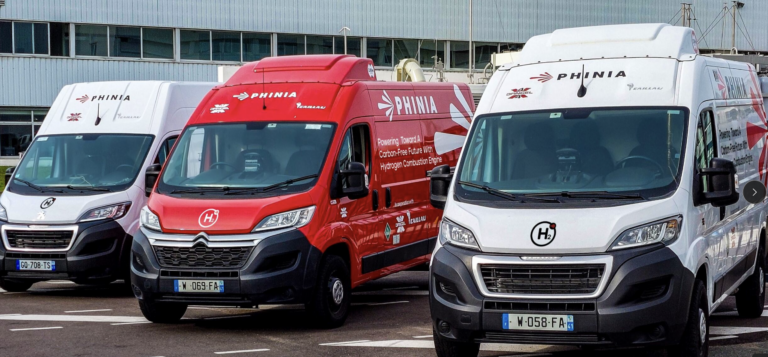
- Kim Kisner
- Business
- 10/01/2024
Driving Innovation in Fuel Efficiency and Alternative Fuels for a Sustainable Future

Based in Auburn Hills, Mich., Phinia (NYSE: PHIN) is a publicly traded company spun off from BorgWarner in July 2023 that is dedicated to advancing sustainable mobility solutions. It specializes in fuel systems, electrical systems, alternative fuel technologies, and aftermarket products, Phinia aims to enhance fuel efficiency, reduce emissions, and help drive the transition to cleaner, low-carbon fuels.
SBN Detroit interviewed Todd Anderson, Phinia’s Chief Technology Officer, to explore the implementation of alternative fuel systems and their real-world applications.

Q: Phinia has allocated 78% of its research and development to fuel efficiency and alternative fuel technologies and 30% of that to zero- and low-carbon fuel systems. Can you tell us more about this initiative?
A: We are committed to driving efficiencies today while moving toward a carbon-neutral and ultimately carbon-free future. It’s important not to focus solely on future technologies when there is a clear need to improve our current energy systems.
By allocating 78% of our budget to fuel efficiency and alternative fuel technologies, we are addressing both immediate and long-term needs. This investment allows us to work on improving the systems that our customers currently use and are ordering while also investing in alternative fuels that will help us achieve decarbonization over time.
Our funding applies to all aspects of our business. The research and development aspect, mentioned above, but also investing in other business functions, including manufacturing, supply chain, and quality to ensure that as a business we are ready to move forward into a new era.
Q: Describe the different alternative fuel systems and what they are used to power today.
A: Each of these fuel systems serves specific purposes and applications, providing a range of options for different vehicle types and needs.
Advanced Gasoline Direct Injection (GDi) Systems are primarily used to power lighter vehicles, from passenger cars to medium-duty vehicles. Recently, we released a 500-bar GDi system with this higher pressure, designed to improve fuel economy and reduce emissions for passenger cars and light commercial vehicles.
Hydrogen fuel cell technology powers electric vehicles (EVs) using an onboard fuel cell that uses hydrogen as fuel. This system is suitable for a range of vehicles, from lighter passenger cars to medium-duty vehicles, and could be particularly efficient for delivery vehicles in controlled environmental settings.
Hydrogen Internal Combustion Engine (ICE) technology is well-suited for heavier applications where high loads, continuous operation, and challenging environments are common, such as heavy commercial vehicles and medium commercial vehicles. Hydrogen ICE provides the power and performance expected from traditional diesel or gasoline systems but without harmful emissions to the environment.
Q: How is developing technologies for alternative fuels different from working on traditional combustion engines?
A: Interestingly, it’s quite similar in many ways. The ways in which we develop liquid fuel systems for gasoline or diesel engines are directly applicable as we move toward alternative fuels. The basic physical principles, such as combustion and fluid metering, remain the same. The difference lies in adapting and refining the elements of these systems to work with alternative fuels.
For example, in a hydrogen internal combustion engine, hydrogen gas is injected into the combustion chamber instead of gasoline. While the core technology remains similar, we need materials that can seal and respond appropriately to hydrogen gas, along with some design refinements.
Q: What are the main challenges in creating and adopting alternative fuel technologies?
A: The technology to use alternative fuels in vehicles is already well understood and has been proven effective. However, the challenge lies in the ecosystem needed to support these fuels.
Take hydrogen internal combustion engines (ICE) as an example. While we have vehicles running effectively with this technology, faster market adoption requires sustainable hydrogen production at a scale that isn’t currently available. The infrastructure to deliver this sustainable alternative fuel to the point of use also needs to be in place. Currently, the cost of hydrogen is higher than will be acceptable for a broad market adoption.
In my discussions with government officials in the U.S., Europe, and Asia, my call to action has been clear: ensure sufficient production of renewable hydrogen while developing the infrastructure needed to deliver it. This will help reduce costs and support wider adoption.
Q: What do you see as the biggest opportunities for growth and innovation in alternative fuels?
A: We see significant growth opportunities in the transportation sector, whether in passenger cars or commercial vehicles. In the shorter term, there is substantial interest in commercial vehicles due to their specific operating conditions.
For example, there is great potential with captive fleets operating on fixed routes, where we can achieve significant progress without needing to rely on widespread public infrastructure for hydrogen deployment. This allows us to make meaningful advancements in those areas.
Additionally, there is interest in alternative fuels beyond just transportation. We’re seeing opportunities in industrial applications, marine sectors, and stationary power generation. Industries like marine shipping, especially large vessels, are actively exploring alternative fuels.
So, while there are significant opportunities in transportation, they extend far beyond that sector.
Q: How does Phinia work with partners in the alternative fuel industry? Can you share any recent partnerships?
A: Partnerships are critical for us — no company can operate as an island.
We partner with government bodies such as the U.S. Department of Energy, the Environmental Protection Agency (EPA), the European Commission, and the UK Transport Authority.
We also work closely with our customers to support their vehicle roadmaps and align our innovations to meet their needs.
We have close partnerships with universities and educational institutions, which provide access to their innovative and advanced thinking while supporting communities and students alike.
In addition, collaboration with our supply chain partners is vital.
Q: How does Phinia ensure sustainability is integrated into product design and development, particularly with your “Design for Environment” approach?
A: Sustainability is critical in the design process. Our design reviews include considerations like the potential for remanufacturing and the end-of-life designation for products, which are vital elements of a circular design cycle.
With our “Design for Environment” approach, we are implementing processes to quantify and reduce lifecycle emissions for all new product development even further.
Calculating the CO2 footprint is becoming a key part of our design cycle and we are including this metric in our overall product development strategy.
Q: What sustainability initiatives or programs have the most direct impact on Southeast Michigan, where Phinia is headquartered? Can you provide examples of local projects or community partnerships?
A: We are actively engaged with Oakland County officials to demonstrate our hydrogen internal combustion van technology, including our direct-inject hydrogen van. Oakland County is involved in the Hydrogen HUB project, and we have had discussions to explore opportunities to secure hydrogen initiatives within the county.
Additionally, we partner with local universities, such as Kettering University, to support various programs, including apprenticeships, co-ops, and scholarship funding.
This approach is not unique to Michigan. With over 44 locations in more than 20 countries, we partner with local universities, community organizations, and local government wherever we have a footprint, ensuring a strong local connection and impact.
Be sure to subscribe to our newsletter for regular updates on sustainable business practices in and around Detroit.
Kim Kisner
- All
- Business
- Community
- Education
- Events

Unique Monique Scented Candles, a Detroit-based business founded by Monique Bounds., aims to produce candles and household products with clean ingredients and local supply chains. What began as a personal hobby during college has evolved into a full-time venture producing coconut oil and soy-based candles made with essential oils and locally sourced materials. SBN Detroit interviewed Bounds about launching a sustainable product line, sourcing challenges in Michigan, and...

Eastern Market Partnership, in collaboration with the City of Detroit’s Office of Sustainability Urban Agriculture Division, has announced $240,000 in grant funding to support Detroit-based farmers and farmer collectives. The grants will advance food access, climate education, sustainable land use, and economic opportunity, with priority given to Black- and Indigenous-led farms, youth-led initiatives, and projects rooted in historically disinvested neighborhoods. The recipients – ranging from cooperatives and community...

Citizen Robotics is a Detroit-based nonprofit that advances the use of robotics and digital manufacturing in residential construction, focusing on improving productivity, sustainability, and long-term affordability. Best known for its early work in 3D-printed housing, it explores how alternative construction methods and new financial models can reduce material waste, lower lifetime operating costs, and enhance the resilience of homes. SBN Detroit interviewed Tom Woodman, founder and president of...







